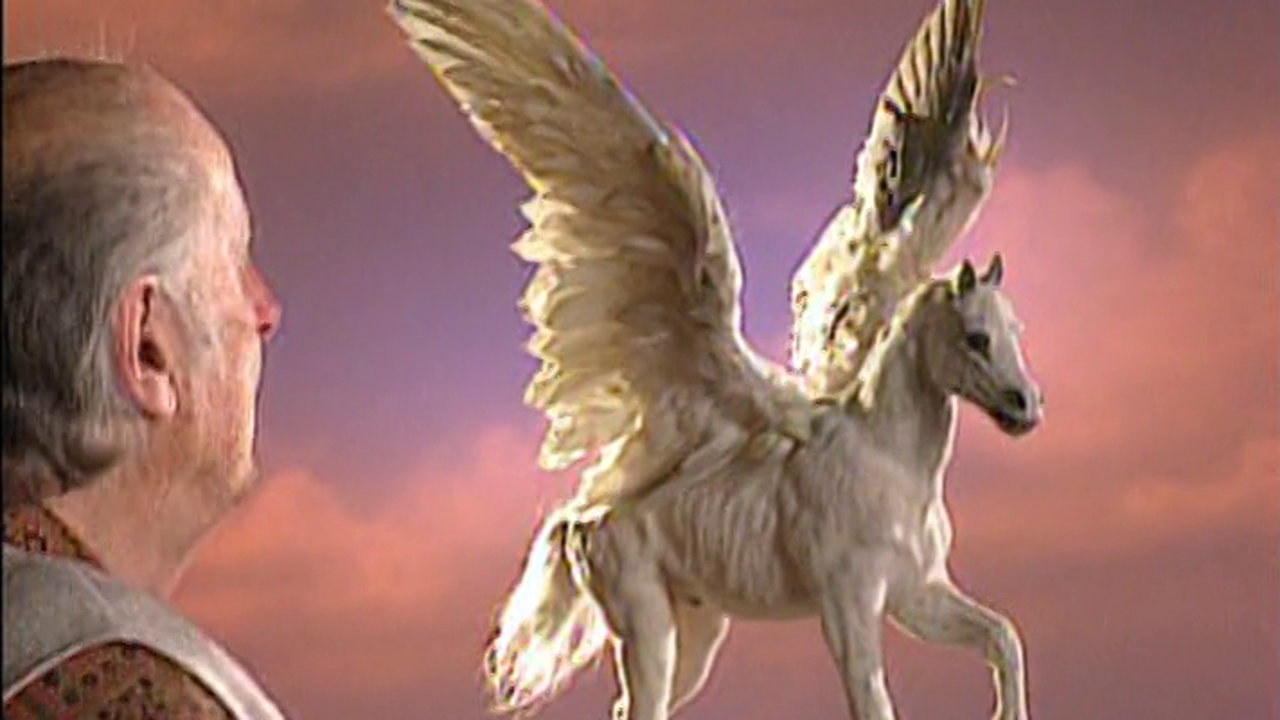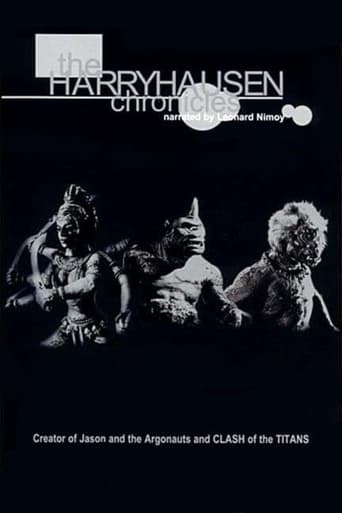

Good concept, poorly executed.
... View MoreFor all the hype it got I was expecting a lot more!
... View MoreGood films always raise compelling questions, whether the format is fiction or documentary fact.
... View MoreThe story, direction, characters, and writing/dialogue is akin to taking a tranquilizer shot to the neck, but everything else was so well done.
... View More"...but I say 'Jason and the Argonauts.'" sayeth Tom Hanks at a special ceremony by the Academy of Motion Pictures Arts and Sciences.No truer words were spoken, even if mister Hanks said it with tongue in cheek. For this film, perhaps appropriately narrated by mister Spock himself, Leonard Nimoy, gives us Harryhausen himself as he comments on the narrative of this film that is essentially an overview of his life's work.The reason this film is so spectacular is because for those of who grew up with the science fiction and fantasy leavings of Hollywood from the silent era up through the 40s, 50s, and 60s, and even grew up with newer offerings in the 70s and 80s, we saw Harryhausen's works, and reveled in them. While others were watching films like "Citizen Kane" or "Casa Blanca", or some other film regarding the egos and passions of ordinary people who thought themselves extraordinary, the select few of us were watching the likes of "Jason and the Argonauts" or "Mysterious Island". This film honors the man who brought those films to us, and also honors those of us who enjoyed them and were inspired by them.How can a films about love in modern times, social upheavals and rifts among normal contemporary people compare to tales of a mad Victorian scientist and huckster visiting the moon and spelunking its populated interior, or voyaging with Sinbad to confront mythological creatures and a black hearted wizard? When characters of other films talk about manipulating markets or unveiling hidden loves and hatreds and how that will effect family fortunes and stock markets, the characters in Harryhausen's films are beheading Medusa, talking with Captain Nemo, battling titanic undersea cephalopods, or gunning down creatures from Roman ruins, winning the girl in the end, and no restraining legalities that seem to pulsate in "normal" films.Heroes, villains, monsters, myths and legends old and new are what Harryhausen's films are all about. The effects of stop motion weren't convincing in terms of realism, but conveyed to us a story of places fantastic and far away. Yes, we knew that the stop motion was stop motion and, unlike my film instructors at the local JC, were not absolutely convincing (sorry Dick and Joe), but it didn't matter, because the story itself required suspension of disbelief, and if you could do that for the story, then it was par for the course that you do that for the film.Harryhausen comments on stop motion, and makes the observation that you, meaning the audience and the film makers both, don't want the effects to look too real because it ruins the fantasy. I'm still debating that in my head, but his words aren't lost. I think what Harryhausen is saying is that if you make a fantasy film, or a film whose emphasis is fantasy, then you want to retain the spectacle of fantasy, no matter what the effects look like.I remember those days all those years ago watching the spectacles of ?Harryhausen's craftsmanship, and loving every minute of them. They weren't just films with special effects, but they were well edited, and sometimes even well acted in spite of budgetary constraints. These are films that, in spite of modern special effects, actually last because of the pacing and amount of artistry that was put into them. The story and overall production keep you engaged, even if you don't like the material. Space creatures, the gods of ancient Greece, monsters of folk lore, legendary sailors of classic and medieval eras, and more are what Harryhausen's body of work are all about. Classic tales brought to life through his artistry and, let's face it, wizardry. If you've seen Harryhausen's films, then see this film.Enjoy
... View MoreAs a big fan of stop-motion and of films like "Jason and the Argonauts" I found "The Harryhausen Chronicles" to be a pleasant reminder of what I enjoyed about those films; while I didn't overall learn a whole lot that I didn't know already, it's a fun little documentary. In case you're not familiar with the man, Harryhausen was a stop motion model animator, painter and sculptor, active in major filmmaking from 1949 to 1981. He was the pupil of Willis H. O'Brien who created the special effects for "King Kong" (1933) and went on to create the special effects for a slew of films, the most famous and best of which are "Mighty Joe Young" (1949), the "7th Voyage of Sinbad" (1958) and Jason and the Argonauts" (1963). The film talks about his early years experimenting with stop-motion and pitching short films to various businesses (including educational films for the army) and the years where he was at his peak, showing off some of the impressive models still in museums or his personal collection and giving us a bit of behind-the-scenes action. We've got several guest speakers, including Henry Selick ("The Nightmare Before Christmas", "James and the Giant Peach", "Coraline"), George Lucas ("Star Wars") and the whole thing is narrated by Leonard Nimoy.The content of the film is pretty self-explanatory so what I'm going to discuss here is why you should watch the film, regardless of if you're a fan of Harryhausen's works or not (you should be). Stop motion used to be pretty popular, particularly in live-action films. Before 1993, when Jurassic Park was released, using computers to generate creatures and monsters didn't happen a lot and even with the case of Spielberg's monster of a film extremely elaborate stop-motion was first pitched as a way to bring the dinosaurs to life. Nowadays, it's nearly unheard of to use anything but computer effects. Good directors and special effects wizards recognize the need to use makeup, miniatures and props but the only time you see stop-motion is in films where a specific look is desired, such as Wes Anderson's "The Fantastic Mr. Fox". Everything is done digitally by teams of texturers, shaders, animators, colorists, etc. Here's where the beauty of Harryhausen's work comes in. All of his films, all of those special effects were done by one guy. Just him, creating these creatures, building and painting them and then spending hours painstakingly bringing them to life one frame at a time. I'm not diminishing the use of computer effects. Every year they look more convincing and in fact they're so good that stop-motion films should now be seen more as an exercise in style than as anything that could be convincing. What I'm saying is that there's a very human touch in these films. When you hear stories about a man ambitiously creating a monster with two tails and seven heads (each of which has a mouth that opens and closes) and animating a long sequence where it battles a live-action actor that's impressive. Then you learn that he had to choreograph his movements against an invisible opponent so that the two pieces of footage could be spliced together, making this complicated effect even more ambitious. There's something special about that. The attention to detail, to ensure that the lighting stays consistent or that the fur moves naturally is really fascinating to watch and hearing how the man was supported by his parents in his early adult years, that's some inspiring stuff.The most important thing for me though, was the fact that this guy worked all by himself. Think about it. Let's say you're 10 years old and you've just seen the most amazing science-fiction, fantasy or horror film ever and now you want to make your own movie. You don't want to make any movie though, you want to make a movie with tanks and monsters and cities getting destroyed. Cameras are easy to get nowadays so shooting it is no problem. But how will you bring your vision to life? Hand animating it might work but that's an incredibly difficult process. Creating the stuff through a computer? Absolutely ridiculous; even if your parents happened to have the software necessary to render your vision, no child has the patience to do so. Your only real option then is to either: use your toys and have your hands sticking inside the frame of the picture, or to use stop motion. It's a technique that isn't particularly expensive, if you're just making a short movie you can get results relatively quickly and they will look good too.One thing that becomes apparent when seeing the man's portfolio is that none of his films are adorned with stories or performances that would have stood on their own. What makes them memorable are the creatures featured in them and the imagination. The reason to see the film is to get inspired and to learn more about a man who was the one everyone aspired to be and the inspiration for so many filmmakers. I don't think if you're not familiar with at least a few of Harryhausen's films this will hit you as it did me, but here's what I recommend you do: get yourself his three best films and watch those with either your kids or someone who is a big fan of special effects and then watch this one. You'll get a new appreciation for what you just saw and if there are children present, they'll be inspired themselves. Some of the criticisms I have is that there could have been a lot more "new information" revealed and that they really don't delve into the state of stop-motion today (or rather, at the time the film was made). As is, it plays more as a special feature to accompany other films, but it's a damn good one. (On DVD, January 28, 2014)
... View MoreThis almost one hour documentary was included on the DVD for "Earth Vs. the Flying Saucers"--a great 1950s sci-fi film. The reason why it was included as an extra is that Harryhousen did the special effects for "Earth" and so it was logical to include the documentary as well.This documentary was narrated by Leonard Nimoy and it was nice because it was NOT a superficial overview of Harryhousen's work. Instead, it started from his childhood and showed the progression of his talents as well as clips from his films. In addition to Nimoy, there are many interviews with Ray Bradbury as well as several other fans and friends. About the only thing I didn't like about this well-written and excellently constructed film were the quality of many of the film clips shown in the documentary. Many are very washed out or very green/red and SHOULD have been cleaned up first. Still, as this is the only serious negative and it's the best analysis of his work that I've seen, it's well worth seeing and will keep you riveted.
... View MoreIm not 100% positive of this, mainly if its the same documentary, but I believe this is on the Mysterious Island DVD. If its not one in the same, its a great hour of very interesting information for those of us into Ray Harryhausen's work and how some of it is accomplished. I've only watched it once so far and I'm at work so I am unable to verify this.Just FYI - I'm seeing posts that it was only $5.50 at Walmart in the discount bin, I paid $7.50 at my Walmart... it wasn't in the bin yet.Some of this post should probably be in the Mysterious Island comments, however I found it appropriate for this section.
... View More